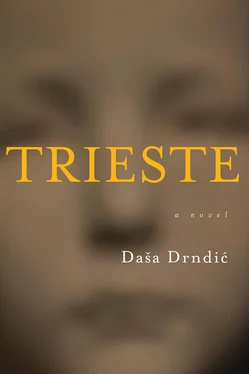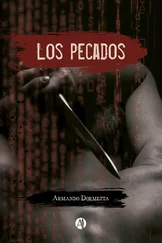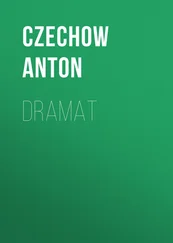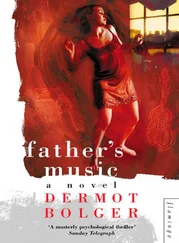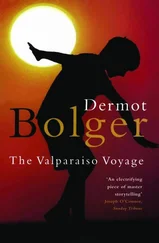Life in the Tedeschi family goes on. For Haya it is altogether ordinary, completely forgettable, as ordinary life is, until the day when, at the beginning of the school year in September 1938, her teachers Nella Negri, Amato di Veroli, Samuel Tagliacozzo, Massimo Pavoncello and Viola Sass do not show up to teach Geography, Mathematics, History, Italian and Physical Education. Until the day when Florian, after dinner, whispering in a conspiratorial hush, as if about to say something obscene, declares, We are Jews, and she asks, What does that mean?
So many shocks, so many tragedies, for centuries, with this meaningless fact that people hide even from themselves, or, conversely, of which they boast, as if it determines who they are and what they are, as if faith and blood are in and of themselves a blessing or a curse. She, Haya, has always felt nothing along those lines, or maybe just a little about being someone’s daughter or sister, someone’s mistress, someone’s friend, which does not imply unconditional devotion to those closest to her. She has always been somehow weightless, free of the heavy burden of mother tongues, national histories, native soils, homelands, fatherlands, myths, that many of the people around her tote on their backs like a sack of red-hot stones. Like little Sisyphuses they lug this wretched and perilous load through life, these clusters of tuberculosis and syphilis germs, these elusive, invisible, and oh so infectious containers of putrescence, they even leap into the containers voluntarily, choke on the sewage sludge in their own fermented excrement, imagining, perhaps, that they are duty-bound to do so, thereby expressing their gratitude that they are still here, as if they have been spared. Haya thinks back to a dwarf tree by the road, a diminutive tree with a round crown of violet-hued blossoms, much like a bright child’s cap as it stands there alone and smiles. That little tree is like a kiss, she whispers. Borders and identities, our executors. Married couples who sow wars, vast upheaval and death.
Instead of her lost faith, Haya, like Kosovel, believes in darkness.
If you had at least been killed for reasons of honour; if you had fought for love or to forage food for your little ones. But no. First they hoodwinked you, then they slew you in war. What do you want me to do with this France which you, like I, it seems, helped survive? What do we do with it, we who lost all our friends? Ah! If it had been to defend the rivers, the hills, the mountains, the sky, the winds, the rain, I would have said: “Gladly, I concur, this is our job. Let’s fight! All our life’s joy is in the fact that we live here.” But we defended a false name for it all. When I see a river, I say “river”; when I see a tree, I say “tree”; I never say “France”. There is no such thing, Jean Giono says, although he has been dead for thirty years.
A few months before the school principal fires him, in 1938, Amato di Veroli, Haya’s favourite school teacher, brings to class his friend, the mathematician Renato Caccioppoli. *It is May. Naples smells of “Santa Lucia”, freshly washed bed linen and lemons. Haya is fifteen. Professor Caccioppoli has a handsome face. Professor Caccioppoli’s fingers are stained with tobacco and he is thirty-five. He hops around as he talks. He grins. If you are afraid of something, measure what you are afraid of and you’ll see it is but a trifle, Professor Caccioppoli says. You will see, your fear is nearly nothing, almost too small to measure .
This is when Hitler starts out on his journey; the newspapers are full of Hitler. They speak of Hitler in history classes, in maths they talk of Hitler, in gym class they talk of Hitler. Hitler arrives in Rome, then comes to Naples; excitement runs high. Four trains follow Hitler’s train carrying five hundred foreign diplomats, generals, agents, party leaders and journalists, all in uniform, one uniform or another, an entire little army. Hitler is in a foul mood. He often scowls. He suffers from stomach pain, mostly gas, so he is forever gulping Mutaflor, prescribed by his faithful companion Dr Morell, but he takes scant joy in his encounter with “the little man”, King Vittorio Emmanuele. And so, as he is depressed, on his trip to Rome Hitler pens a will. He leaves the Party his personal effects, Berghof, his furniture and paintings, and to Eva Braun, his sisters, his other relatives, secretaries and servants, he leaves tidy sums from the sales of Mein Kampf .
At the border crossing by the little town of Brenner, the inhabitants greet Hitler’s five trains with enthusiasm; they wave banners, fling flowers on to the train carriages and smile, though it is difficult to say why (they smile). There are Italian soldiers here too, many Italian soldiers, and Fascist troops. A specially rehearsed orchestra plays both anthems, and the Duke of Pistoia, in the name of the king, holds a brief speech in which he tells the Germans how glad the Italians are to see them, and how very welcome they are in their beautiful country. The houses along the railway line are decked with banners sporting slogans that tout German-Italian friendship. The landscape is quaint, the many colours blinding.
Hitler does not enjoy himself in Rome. He is driven to the royal palace in a coach instead of a car, to a dinner with the queen, who sits next to him and to whom he says not one word; and, furthermore, he is irritated by the huge crucifix she wears around her neck, so he stares at her bosom. The king spreads all sorts of stories about Hitler’s odd habits, and reveals that during his first night there Hitler asks for a woman to be sent to his room, so that she can tuck him into bed as if he were a child.
A great military and naval review is prepared in Naples — that should brighten Hitler’s spirits. It is 5 May, 1938. The bay is full of submarines and torpedo boats. School has been cancelled. The pupils are ordered to join in the welcoming throng, to wave and shout. Haya says, I am not going . Ada and Florian say, That is imprudent. All of us will go .
Naples is tricked out gaily. There are flowers everywhere in classical style and colourful banners flap in the wind as if readying for Carnival. The façade of San Francesca da Paola at Piazza del Plebiscito is disfigured by dozens of drapes of red and black bunting; as they ripple in the spring breeze, the church beneath them looks maniacal, keening at one moment in deep grief, and at the next, laughing hysterically.
The Italian navy is doing its level best to wow the Führer, performing mock naval battles. The audience is enthralled: gasps of delight and wonder rise to the skies, aaahhs and ooohhs float in the air like little puffs of breeze. The submarines, like immense black cormorants, dive and surface, seeking imaginary prey; children shriek and cavort; older men and women sit on deckchairs brought from home, as if out to enjoy the sun. After every exercise hats fly into the air, men’s and women’s hats. Thrill reigns, a sense of community, a vast delight at belonging. To one country, one people, to two leaders. The city has donned its uniform. Secret agents, Fascist spies, the police, military guards, come pouring out of everywhere. The Neapolitan songs slip down under the cobblestones and quiver, crouching, silent, trampled by the newly born passo romano .
In the evening Hitler is taken to a performance of Aida , to relax. The next day they bring him back to Rome where on 7 May, at a banquet at the Palazzo Venezia, he grants South Tyrol to Italy in a generous gesture. In return, Hitler receives the Discobolus of Myron. Everyone is pleased. The visit is a success.
Late in the school year the students ask their teacher Amato di Veroli, When will you bring Caccioppoli back? Professor di Veroli says, That won’t be possible. They’ve locked him up in a madhouse .
Читать дальше
